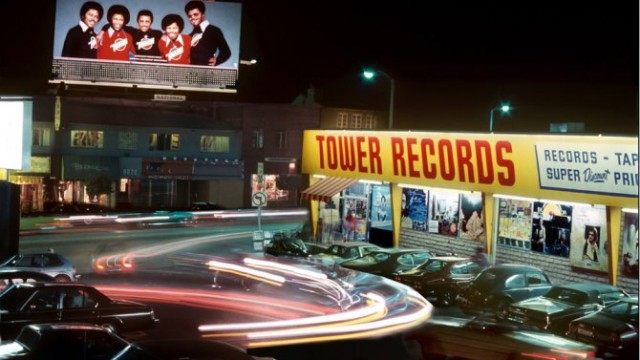What you think of Tower Records may depend on your age and location. For large swathes of America, Tower Records was a store in big city backgrounds. For people of a certain age, Tower Records represented the worst of corporate greed. For others, they were the rambunctious apotheosis of music industry sales. Through All Things Must Pass, director Colin Hanks posits that Tower Records is a microcosmic representation of the music industry as a whole. Founded in 1960 and liquidated in 2006, Tower Records’ story would seem to follow the story of the record companies…if you buy into the narrative that the record companies are going broke.
Tower Records began as a record singles rack in Tower Cut Rate Drug Store. As a kid, Russell Solomon worked at the drug store alongside his father, the owner, until he expanded into a department and finally an independent storefront. Hanks and Solomon posit that the reason Tower Records finally caught on was the development of the pop record, moving the industry from singles to the LP.
Hanks lovingly paints the picture of Solomon as an aggressive risk taker, who counts on all of his bets paying off. His risk taking expanded down through the ranks of the store, with the stores hiring party animals they felt represented the market they were serving. Moreso, Hanks also details the Tower Records industry as an ongoing blend of business and partying where sex, drugs, and alcohol were a required part of the game. If you guessed that it was largely a boys club, you’d be correct.
All Things Must Pass is a no apologies affair. The closest to a regret that anybody has is regretting they didn’t know how to roll with the internet. Even though it was well known that Tower Records was more expensive than its major competitors, a fact only bolstered by Tower’s decision to eliminate singles from its product, the movie seems to posit that it was the internet that ultimately killed Tower Records in its physical form. Ironically, Tower Records lives on as a website.
Hanks isn’t here to bury the dead. He crams the movie with eulogies from a wide swath of “important” rock stars. Dave Grohl, who couldn’t be arsed to be in Montage of Heck takes time out of his busy schedule to talk about his first job at Tower and the importance of the store to the industry. Elton John, taking time out from playing weddings for Rush Limbaugh, is even on hand to sing praises for the corporation. Through the use of celebrities, Hanks is exposing his own insecurities about the project. Is a record store important enough to have a feature length film? Hanks screams yes, and points to these superstars as evidence.
In spite of his insecurities, Colin Hanks proves himself an astute documentarian. Even though Tower Records would seem to be a great bottle subject – chronological with only one company – Hanks pulls together external influences and internal struggles to create a complex image of a corporation and the need of a strong leader. The ultimate flaw of Tower Records is Hanks’ executive worship. He treats Russell Solomon with the same reverence that Appleheads use for Steve Jobs. As for the rest of the workers, much like Tower Records, Hanks begins with a focus on the employees but eventually forces his view to narrow to executive dealings while the hard working peons are increasingly ignored (unless you got into an influential rock band). Even if you don’t quite buy into Tower’s own mythology of its own self-importance, All Things Must Pass provides a excellent cautionary tale of corporate growing pains and flying by the seat of your pants.


